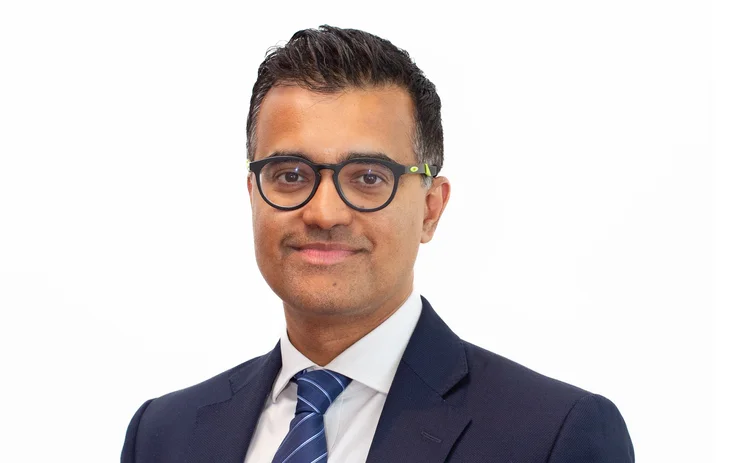
Credit derivatives house of the year: UBS
Asia Risk Awards 2024

The merger with Credit Suisse means UBS has once again found a firm foothold in Asia-Pacific’s structured credit market – a business it retreated from more than a decade ago. Senior executives in the region are now looking at how they can build on this foundation.
UBS’s decision to scale back its fixed income and credit business in 2013 was in response to more punitive capital rules coming in. Credit Suisse, on the other hand, has had a strong credit business in Apac for many years – one that it has repeatedly won accolades for.
“Fusing Credit Suisse’s market-leading position in credit derivatives with UBS’s client franchise means we are able to structure transactions for our clients that neither UBS nor Credit Suisse were able to deliver separately in the past,” says Vallabh Shastri, Apac ex-Japan head of structured credit and financing structuring. “The combination of UBS and Credit Suisse is a great example of one plus one being greater than two.”
Shastri assumed his current role at UBS in March 2023, just as the merger between the two Swiss investment banks was announced. He was previously Credit Suisse’s head of credit structuring for Asia ex-Japan.
Shastri says the integration of Credit Suisse has helped UBS to accelerate the development of its credit structuring franchise in Asia-Pacific. This is not to say the integration of Credit Suisse’s credit business has all been plain sailing, though.
“The primary challenge for us was the fact that UBS had exited many structured credit businesses years ago. This meant there were a lot of things from Credit Suisse that we couldn’t just ‘cut and paste’,” Shastri says. “However, thanks to our strong and committed team, we got there in the end. Moreover, we managed to integrate the two businesses while keeping the lights on and our clients happy.”
UBS innovation
Much of the success that UBS has enjoyed in the Apac credit markets over the past 12 months comes down to the bank’s ability to quickly structure innovative solutions that match evolving client needs. This has certainly found favour with clients.
“[Over the past 12 months], UBS has provided innovative solutions based on credit indices, offering make-whole [call] conditions, which other investment banks are not able to provide,” says the head of one derivatives department at a Korean securities firm.
The client also praised the flexibility of UBS’s solutions, which can be fine-tuned according to the internal risk restrictions of individual firms.
“This is [one of] the key [requirements] for Korean securities houses when trading credit solution products,” says the client.
Thinking outside of the box has helped UBS’s credit structuring franchise overcome some structural disadvantages. For example, although UBS has a strong structuring team in mainland China, the investment bank’s onshore balance sheet is not as strong as the balance sheets of some of its competitors.

“Some cross-border solutions might be more readily available to those banks with a stronger balance sheet,” admits Ning Jiang, head of credit sales for Hong Kong. “However, thanks to our unique capabilities (in terms of our salesforce, structuring expertise and trading desk), we can still provide clients with solutions that have very attractive risk and return profiles.”
An example of one of these solutions was a repack note linked to onshore certificates of deposit issued by Chinese banks. UBS buys these renminbi-denominated instruments and passes them on to an offshore special purpose vehicle. The end-investor receives US dollar interest and principal at maturity.
What makes this product so attractive is the market dislocation that exists in the USD/CNY FX forward market, with onshore forwards trading at a significant discount compared to the offshore market.
Using this format, UBS has been able to offer clients a basic yearly coupon yield of 6%, provided in both funded and unfunded format, with a duration of one year. Additional leverage is provided to clients via total return swaps, which pushes the yield up to between 8% and 10%.
“This was a great opportunity for us because, with an inverted yield curve in the dollar market, there was massive demand – from institutional, corporate and private wealth clients – for short-dated bonds offering attractive yields,” says Jiang.
The transaction not only showcases the strong China capabilities of UBS (which can source onshore bonds and certificates of deposits via both the Bond Connect and Qualified Foreign Institutional Investor) but also the credit structuring capabilities that have been brought in from Credit Suisse. The offshore credit repack is something Credit Suisse has done many times in the past.
Moreover, some of the clients that UBS traded with had never considered repack trades before.
“Not only did the trade deliver additional value to these clients, but it also opened up a whole new structure for them that they can make use of in the future,” says Jiang.
UBS launched this structure at the start of June and, within a single week, had traded $250 million notional. Since then UBS has traded a further $750 million notional, although with the narrowing of the spread between onshore and offshore USD/CNY, the structure is not delivering the same level of returns as when it was first launched.
Another valuable credit solution UBS brought to market this year was for a life insurance company in Singapore. Unable to find sufficient high-yielding fixed-income assets in the local market to match their Singapore-denominated liabilities, the client was forced to diversify overseas, but this exposed them to FX risk.
“Hedging out this FX risk in the markets has a number of disadvantages,” says Shastri. “One, FX hedging is done on a recourse basis, so if the market really moves in the wrong direction the investor could end up losing more than the value of the asset they are trying to hedge. Two, hedging Singapore dollar can be onerous for some clients because of the margining requirements.”
UBS’s alternative solution was a repack note, consisting of a carefully curated basket of foreign bonds. The note provides a customised redemption profile. It also allows investors (upon request) to replace any underlying issuer at market levels, thus offering the client flexibility to manage the portfolio based on prevailing market conditions.
“The beauty of the repack solution is that clients can use the asset itself to collateralise the hedge. Everything happens within this structure,” says Shastri.
UBS was able to deliver this solution very quickly, bringing it to market within a week of engaging with the client. Such agility owes a lot to UBS’s global trading platform. By using this architecture, the product team in Singapore could quickly scan different baskets of varying credit quality and duration to pick out the exact portfolio of assets the client needed.
The notional value of the repack note was S$80 million ($61 million), with a duration of two years and an annual coupon of 4.4%. The trade was executed initially on behalf of a single client, but UBS is now looking at rolling it out to other clients too.
“It’s a really clean, simple and elegant solution that fills an important gap in the market,” says Shastri.
The third structure that demonstrates UBS’s developing credit-structuring capabilities is an over-the-counter skew facility for the Korean market. This allows clients to sell protection on a credit default swap index and to buy protection on single names. While UBS has been offering skew trades in Korea since 2020, this year (2024) has been the most successful yet, based on the notional value of transactions executed.
“This arbitrage could be as small as 10 basis points, but you need to be able to do the trade with leverage. For example, 30 times long the index versus 30 times short the single names – or vice-versa,” says Christine Wang, co-head of global market distribution for Apac.

The trade pays a risk-free amount to the client, in return for the client taking on a certain amount of default risk. However, thanks to its warehousing capabilities, UBS has been able to limit the amount of exposure the client faces. Although this is a leveraged trade, UBS only requires clients to post margin against the notional value without the leverage.
“Korea is a very interesting market where you have a lot of sales teams at securities houses who have been given the mandate to enter into arbitrage trades. So, they’re happy to bear the mark-to-market but they need to make sure they are free of default risk. They can’t run outright risk in the credit market,” says Wang.
UBS traded $325 million notional of these trades with Korean clients, between the second half of 2023 and the first half of 2024. Given this product’s success in Apac, the Swiss bank is now looking at rolling the product out to other markets in Apac.
Strong foundations
UBS’s successes this year do not represent a wholesale takeover of Apac’s credit markets. Nonetheless the structures that the Swiss bank has been able to craft (which arguably would not have been possible had it not joined forces with Credit Suisse) show a strong foundation from which to launch a dramatic return to credit structuring.
“Our unified credit derivatives structuring team covers both the asset side and liability side of the business. This is a powerful combination that allows the team to deliver client solutions in a holistic way,” says Wang.
Executives hope that combining these new capabilities with a robust risk management framework has primed UBS for long-term success.
“We have always been a responsible player in the market,” says Satoshi Amatani, head of Apac structured credit trading. “A great deal of our effort on the structuring and trading side goes towards trying to come up with solutions that are balance sheet-efficient, that have great risk-return profiles and, most importantly, that are in line with our internal risk controls. This is why our credit business will be sustainable and continue to grow.”
Only users who have a paid subscription or are part of a corporate subscription are able to print or copy content.
To access these options, along with all other subscription benefits, please contact info@risk.net or view our subscription options here: http://subscriptions.risk.net/subscribe
You are currently unable to print this content. Please contact info@risk.net to find out more.
You are currently unable to copy this content. Please contact info@risk.net to find out more.
Copyright Infopro Digital Limited. All rights reserved.
As outlined in our terms and conditions, https://www.infopro-digital.com/terms-and-conditions/subscriptions/ (point 2.4), printing is limited to a single copy.
If you would like to purchase additional rights please email info@risk.net
Copyright Infopro Digital Limited. All rights reserved.
You may share this content using our article tools. As outlined in our terms and conditions, https://www.infopro-digital.com/terms-and-conditions/subscriptions/ (clause 2.4), an Authorised User may only make one copy of the materials for their own personal use. You must also comply with the restrictions in clause 2.5.
If you would like to purchase additional rights please email info@risk.net
More on Awards
Market data provider of the year: S&P Global Market Intelligence
S&P Global Market Intelligence has consistently met demands across Apac’s fast‑evolving capital markets, securing its win at the Risk Asia Awards 2025
Best user interface innovation: J.P. Morgan
J.P. Morgan wins Best user interface innovation thanks to its Beta One portfolio solution
Market liquidity risk product of the year: Bloomberg
Bringing clarity and defensibility to liquidity risk in a fragmented fixed income market
FRTB (SA) product of the year: Bloomberg
A globally consistent and reliable regulatory standardised approach for FRTB
Best use of cloud: ActiveViam
Redefining high-performance risk analytics in the cloud
Best use of machine learning/AI: ActiveViam
Bringing machine intelligence to real-time risk analytics
Collateral management and optimisation product of the year: CloudMargin
Delivering the modern blueprint for enterprise collateral resilience
Flow market-maker of the year: Citadel Securities
Risk Awards 2026: No financing; no long-dated swaps? “No distractions,” says Esposito







